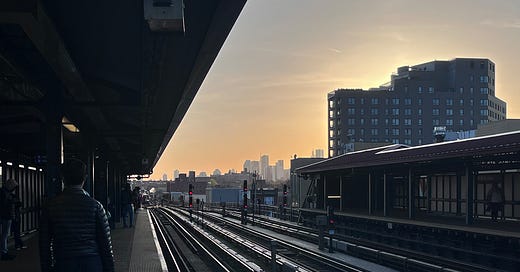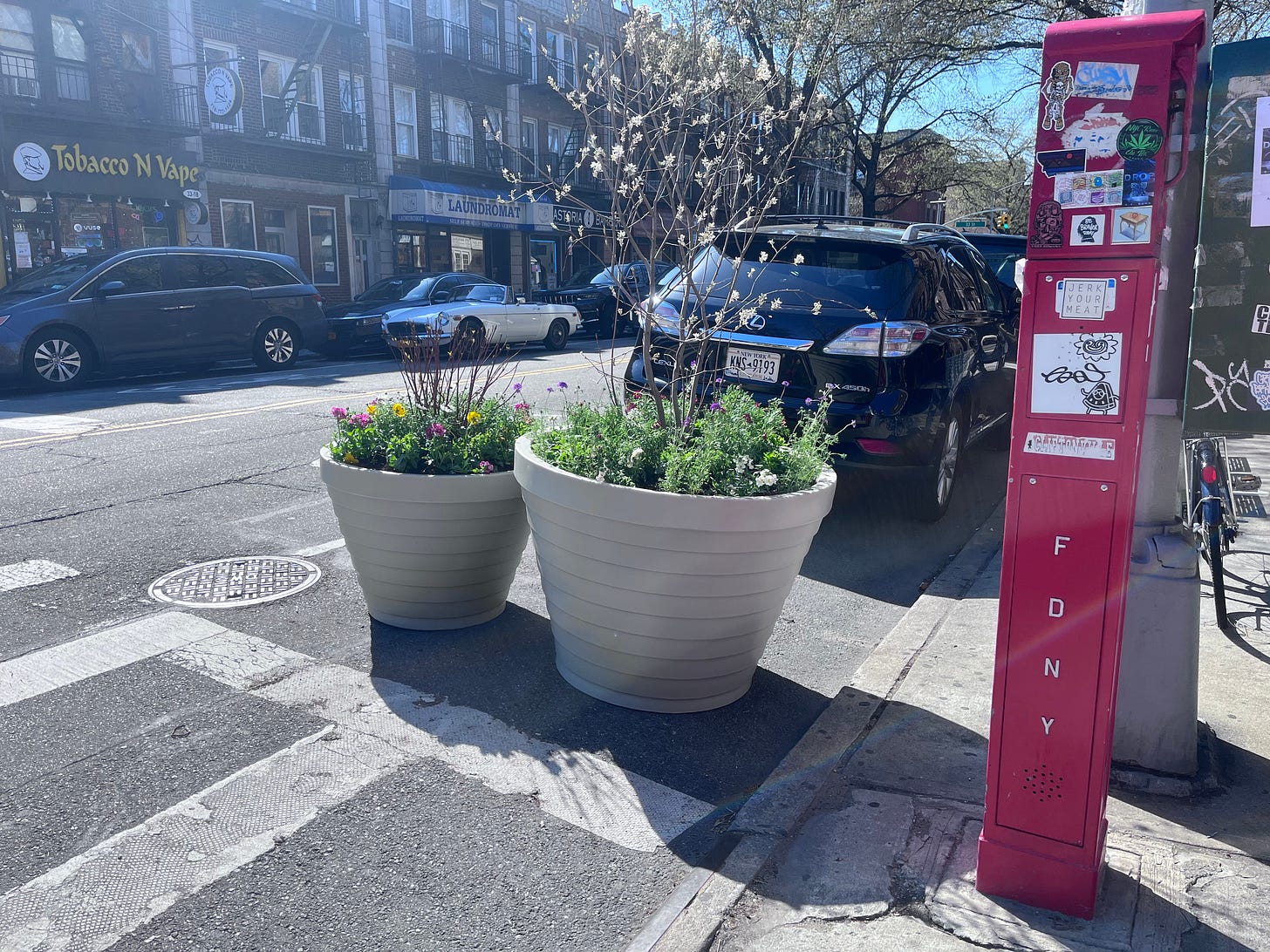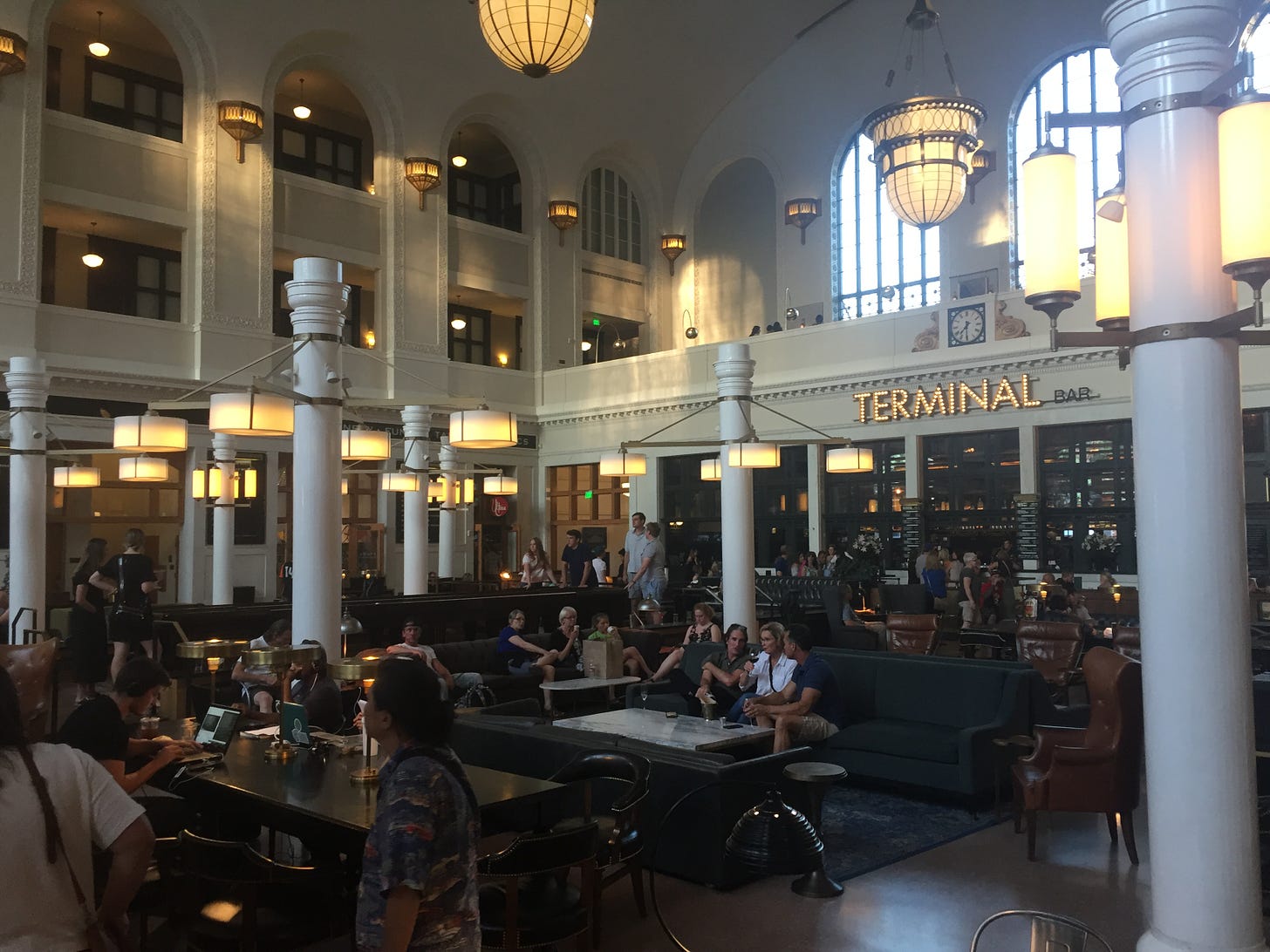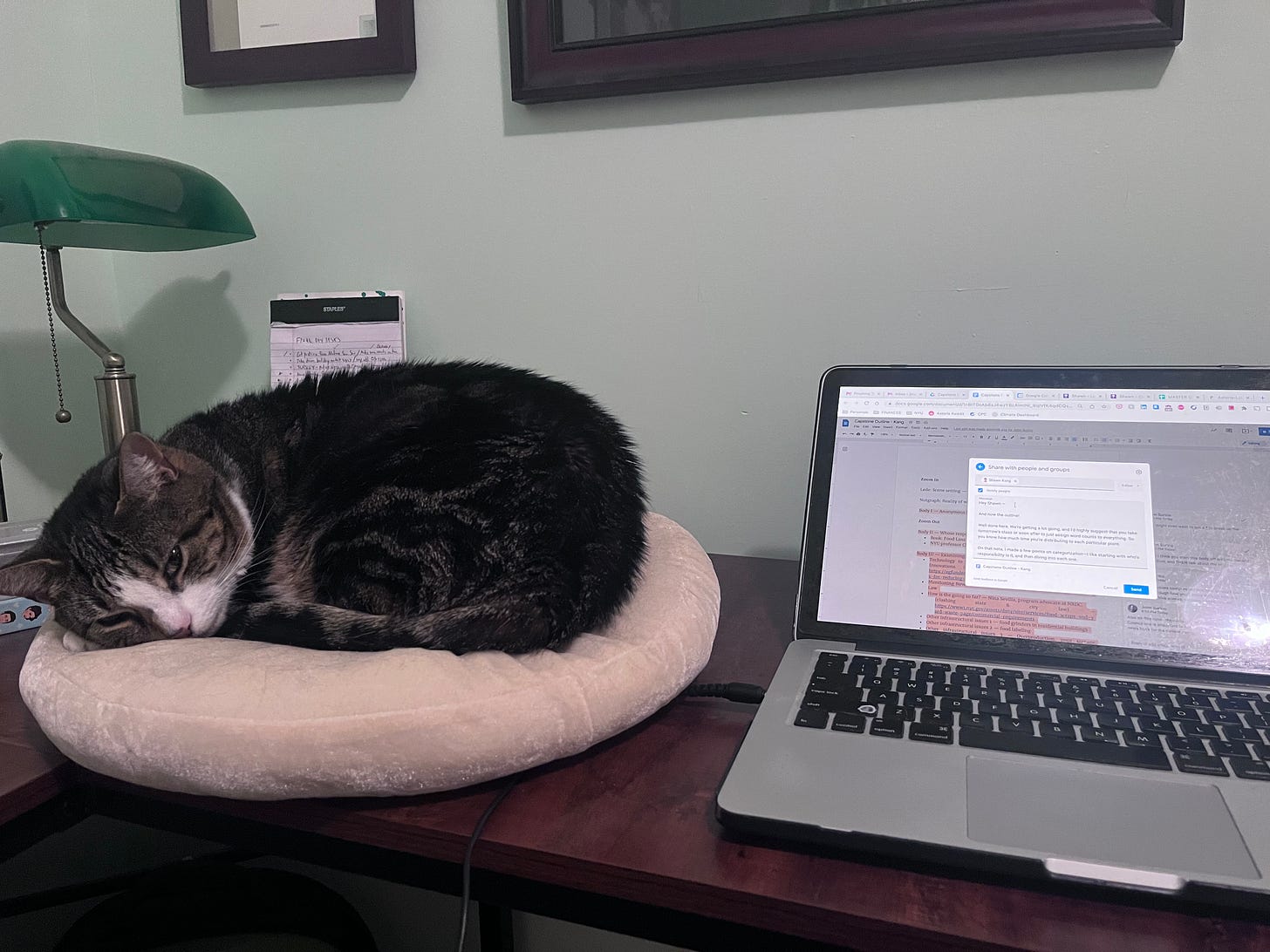Ässalamu läykum
And welcome to this newsletter.
It's where I (John Surico) share thoughts & writing each month on cities & their contents: streets, people, energy, cultures, food, form, etc. Thanks for being here, and hope you enjoy your time!
This Streetbeat is on the shorter side due to the collapse of time and space in this third pandemic spring, where it feels, as one friend described it, that “we’re all riding one huge wave together.” Practically everyone I know is working longer hours, while also contending with a resurgence of in-person activities on weeknights and weekends. Like 0-60, but staying at 60.
Anyway, this Streetbeat is shorter!
A quick note: during Earth Week, New York City Mayor Eric Adams announced nearly $1 billion for the NYC Streets Plan, a template that aims to install hundreds of bike and bus lanes across the city in the next few years. He previously floated cuts—and even $900 million is less than the City Council asked for—but it’s a tell-all sign of the conversation’s changing parameters. As I reported last year, this was apparent on the mayoral campaign trail—when de Blasio was elected in 2013, he poo-poo’ed the pedestrianization of Times Square (and later acquiesced, of course); in 2021, some candidates said they wanted to make all of Manhattan car-free. Adams was a bit less gutsy then, but this grand sum would’ve been unheard of even a few years ago.
And finally, before jumping into things, I want to give a shout-out to Along for the Ride, a missive that I love seeing in my inbox. I first met the author Sarah Barnes in London, when we were planning TransportCamp in 2020—COVID had other plans, but it will happen one day!—and since then, it’s been a delight to read her takes on AVs, cycling, streets, accessibility, and so much more. My fave parts: she explains new academic studies in a way that makes them far more digestible, and lets guests take over every so often. Give it a read!
Back on the Radio
Any time Diane Jenks invites me onto her Outspoken Cyclist podcast, I jump on the opportunity. This time we chatted about the stubborn public transit recovery, pushback against building near transit hubs, and BIKES! (Of course.) I come on around the 25-minute mark. Listen here.
Summits, Assemblies + Conferences
As mentioned, fellow Streetbeat reader, we are witnessing a pretty monumental tide of in-person events returning to our daily lives. (Maybe too much?) But one notable change this spring/summer vs. last is the return of larger gatherings, like galas, conferences and Coachellas. I’ll be attending a few this next month:
The NYC Greenways Summit. A two-day conference (May 5th-6th) in downtown Manhattan on the need for the five-boro greenway first envisioned three decades ago. For Bloomberg CityLab last June, I wrote about the push for a ‘greenway stimulus’ in Washington, parts of which made it into the infrastructure bill—and perhaps more will come in the revived push for a big climate and social spending bill. (Just don’t call it Build Back Better.) Thrilled to be moderating a panel called ‘Advancing an Equitable Greenway Network in NYC’ with some great voices.
The RPA Centennial Assembly. As I reported for CityLab in January, it’s the hundred-year anniversary of Regional Plan Association, one of the most influential planning groups in the country. I was very humbled that they invited me to join their week-long Assembly as an honorary guest, culminating in a big celebration on the Hudson (May 6th). The governors of the tri-state (New York, New Jersey and Connecticut) will be there, too.
The Spring Urban Parks Roundtable. It’s been a really great start to the work at Central Park Conservancy’s Institute for Urban Parks, where I came on as scholar-in-residence not too long ago. And part of that work includes the Institute’s famed Roundtables, where they convene parks groups from around the country in a major city for a few days of engaging conversations, workshops and field trips around a central theme. In this case: equitable park development, in St. Louis, Missouri (May 12th-13th). First time seeing the Gateway to the West! Shout if you have any (barbecue, transit, walking) recommendations.
OSA: Think Positive
It’s been a whirlwind of a launch month for the 31st Ave Open Street.
Minus the zany April weather, we’ve had regular programming each weekend, our first Dave’s Lesbian Bar bash, and the start of the weekly Urban Farm Stand by The Connected Chef. Last year, when we started in June, we didn’t have any events until about July or August, and even then we were desperately seeking to activate the space. Now, we’re constantly negotiating it.
(Oh, and we got some lovely planters at each corner, as seen above. Shout-out to the Horticultural Society for installing them!)
But we also have faced some headwinds. After a raucous meeting with some of the businesses on the two blocks, we’re making a much more active effort to include and communicate programming to all stakeholders. We put short- and long-term proposals on the table to make sure this project works for everyone. Admittedly, the meeting should’ve happened last year—and we knew that. But public space is a work in a progress, not a closing window of opportunity.
That being said, one theme that resonated a lot with me this month is a problem cities everywhere face: the lack of places to register positivity. I thought about this on the walk to the business meeting—a few supportive shop owners I saw said something along the lines of “I have nothing to complain about, so why would I come?” As a result, the meeting mostly attracted those who had more negative things to say, creating a sense that opposition was the popular feeling. When in reality, the people who like it just didn’t feel any urge to speak up.
We see this everywhere, right? Community boards and elected officials have a hotline for complaints, but not a hotline for “Great job!” So it’s unsurprising that they may have a truncated perspective of the public’s pulse—the angriest are the loudest voices in the room, and so, of course, you’d believe the rest of the room thinks the same. When we experience something positive in our city, we just enjoy it, and that’s a fatal flaw of governance. Yes, there are plenty of people who will tell you how much they hate that new bike lane—but there are also plenty of people (likely even more) who ride it everyday without making a peep, just registering it as another new addition to their streetscape. This is how you end up with cities like San Diego apologizing about them.
It’s easy to then forget the hundreds of residents who told us how much they love this new space, or the comments we get each weekend while out there volunteering. (I wrote a whole bit on negative reinforcement a few months ago, with negativity lingering longer than positivity.) But what, I think, would be truly transformative is the creation of community engagement systems set up to hear both sides at least equally. Where the quieter voices in room aren’t ignored because they didn’t know they had to go to a meeting to say anything, really. Or even that there was a meeting in the first place.
Onward!
Solutions Corner: Back Next Month
“Everything Everywhere All at Once” is the name of what, I’ve heard, is an excellent movie from A24 about the multiverse, but also, it’s what I’d describe as my work life right now. So no solutions this month! Back in June.
City in Spotlight: Denver
I’ve been to Denver a few times. Each visit was pocketed by about a five-year span, but at the Colorado capital’s rate, that’s a lifetime. Denver has exploded: its downtown revitalization—prodded by endless microbreweries, legal pot tourism, relatively affordable standards of living, and phenomenal development around its expanding light rail, which makes for nice walkability—has turned this mid-sized city into one of the hottest property markets in the U.S. And of course, almost inevitably, that has incited a swelling tech boom. Denver, CA!
Denver has always been a place for more active travel: I often joke that for the first time ever, I had to wait on a line to get onto a hiking trail outside of nearby Boulder. Coloradans love the outdoors—it’s like an REI store, but turned into a state. So naturally, cycling plays a big role in daily life there.
I’ve got more reporting coming out on e-bikes soon, but the big news right now is in Denver: the city just introduced an instant rebate on e-bike purchases of up to $400. (Lower-income residents can get up to $1,200 off, and there’s an additional rebate of $500 for e-cargo bikes.) It’s the second major American city to do so—Austin offers $300—but its rebate is the most expansive. This is part of their new voter-approved Climate Protection Fund, which generates $40 million each year through a 0.25% sales tax, filling the void of inaction in Washington.
Bright Side: Soccer + Subways
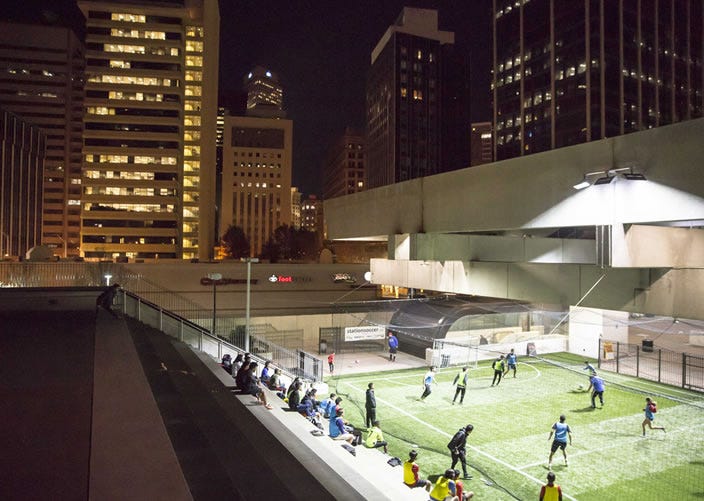
I’m a big fan of smart zoning around transit. In the past, I spotlighted “Elevate Transit: Zoning for Accessibility,” the brand new NYC rule that allows developers to build higher around transit hubs (good!) in exchange for putting in and maintaining station accessibility improvements (even better!), like elevators and ADA-compliant ramps. A development near me is already taking advantage of it, upgrading the very inaccessible, very busy aboveground subway stop at Queensboro Plaza with some flashy new lifts.
But Atlanta is knocking it out of the park. (This, I am sorry, is a pun.) In 2016, the city opened what it dubbed the first ever ‘transit soccer league,’ at Five Points Station downtown. This was done through a partnership with Soccer in the Streets, a nonprofit that brings the sport to underserved communities. It’s called StationSoccer: essentially, vacant land around MARTA (Atlanta’s public transit system) stations is developed into soccer (read: football, for the non-U.S. readers) pitches, in an effort to both boost ridership and plug up gaps in access to parks and recreational facilities. Four fields have been built, and six more are expected.
The best part? The teams who play are called “The League of Stations.”
Parklet of the Month: April 2022 Edition
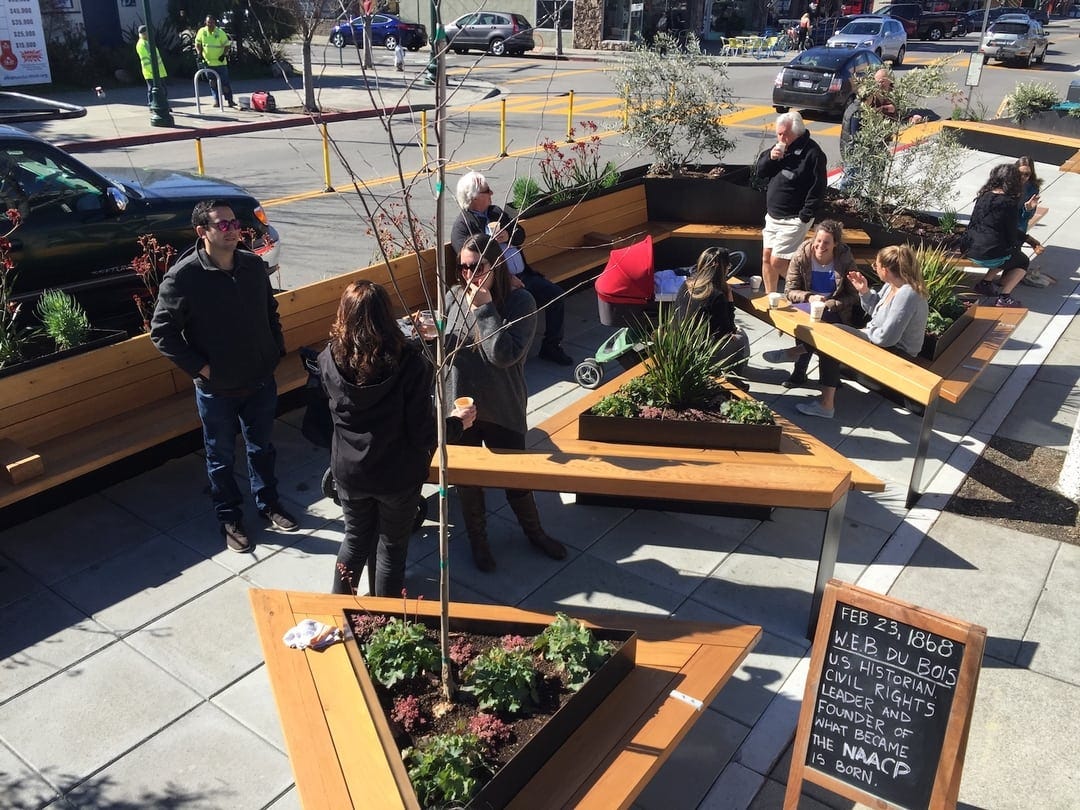
Name: Hal’s Parklet (Albany, California)
What: A hybrid parklet-bus stop, open to all just in front of Hal’s Office Coffee. (Hence the name.)
FKA: A bus zone.
Nominated as one of the best bus stops in America by Streetsblog, the parklet was first envisioned by a couple who owned the two adjacent stores. The only obstacle: the bus stop out front. But after consulting with the city, they managed to settle on a design that serves both bus riders and users of all kinds. Now it’s popular from sun up to sun down. Project for Public Spaces has the full history.
Want to shout out a parklet where you live? Submit yours here.
Streetbeat Gig Board
New York Focus, the new outfit and nonprofit covering the Empire State, is looking for a climate and environmental politics reporter.
The Columbus Avenue Open Street is back for the season, and its Business Improvement District (BID) needs a team to run it.
New Yorkers for Parks, the city’s top advocacy group for green space, has a role open for a policy and research project manager.
*Sorry if these roles are NYC-specific! I’ll make a point to geographically diversify in future posts. In the meantime…
Have a job to post? Submit it here.
